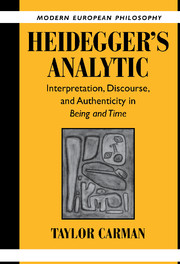3 - Interpreting Intentionality
Published online by Cambridge University Press: 19 July 2009
Summary
You have to have found a thing, if you want to know where it lies.
GoetheHusserl's theory of intentionality is uncritical and incoherent, I have argued, owing to its disregard of its own hermeneutic conditions, that is, the conditions underwriting its own intelligibility as philosophical discourse. Heidegger's existential analytic, by contrast, offers an account of the conditions of interpretation in order to set out a fundamental ontology from within which we can understand how intentionality manages to be intelligible to us at all as such. The hermeneutic phenomenology in Being and Time, then, rests on a radical repudiation of the very idea of a rigorous discipline of pure description and embraces instead an unabashedly interpretive conception of phenomenology itself. Heidegger's fundamental ontology can thus in no way be understood as a mere amendment or continuation of the Husserlian program, as some critics, particularly those who sympathize with Husserl's views, would have it.
Husserl, however, is by no means alone in his critical neglect of the intelligibility conditions of his own philosophical claims. Indeed, more recent theories of intentionality persist in a peculiarly unreflective mode, both methodologically and ontologically, and Heidegger's analytic of Dasein can be read as an extended reminder of the existential conditions of the intelligibility of philosophical discourse itself and the distinctions philosophers habitually draw between subjectivity and objectivity, internal and external, mind and world.
- Type
- Chapter
- Information
- Heidegger's AnalyticInterpretation, Discourse and Authenticity in Being and Time, pp. 101 - 154Publisher: Cambridge University PressPrint publication year: 2003

